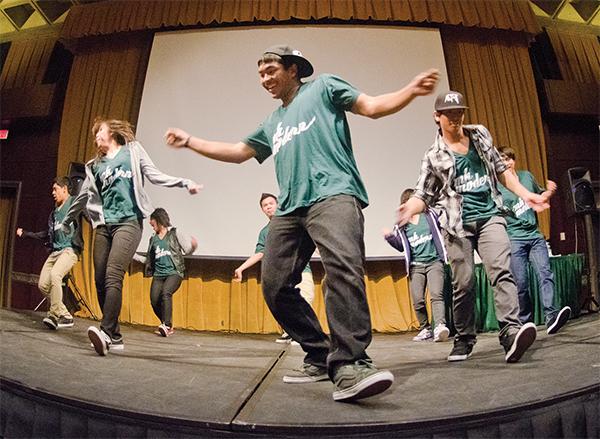Resolving human trafficking

MK Modern performs at Sac State benefit show:MK Modern, a dance group from Davis, performs in front of Sacramento State during a benefit show to raise awareness for human trafficking in Sacramento.:Robert Linggi – State Hornet
March 1, 2011
“Priceless,” a benefit concert for human trafficking, was held at Sacramento State by Kappa Psi Epsilon to help raise student awareness in Sacramento and around the world through guest speakers and dance routines on Thursday.
Human trafficking is the taking of people by force, fraud or deception, with the aim of exploiting them either for sex or forced labor, according to United Nations Office on Drugs and Crime.
According to a recent FBI report, it was found that Sacramento is among the top five hot spots in the United States for human trafficking.
The event was hosted by the sorority and My Sister’s House, an organization that specifically addresses the needs of Asian and Pacific Islander women and children impacted by domestic violence in the Sacramento area.
The concert consisted of rap artists, spoken-word poets, and a group of 10-year-old break dancers, with facts about human trafficking in between the performances.
Senior business major Angelina Abella, president of Kappa Psi Epsilon and the co-host of the event, said she feels especially attached to the issue because it has so much to do with her culture.
“I know it’s a big problem in Asia, but then to find out it’s happening in Sacramento, it’s even closer because not only is it happening my people, but the community that I live in too,” Abella said.
It is estimated that between 600,000 and 800,000 people are trafficked annually worldwide.
Co-host Paolo San Luis, senior biology major and vice president of Epsilon Sigma Rho, left the Philippines when he was 16 and remembers witnessing human trafficking right in his own backyard.
“I saw (human trafficking) firsthand, my neighbors getting taken away, getting kidnapped and you can’t do anything about it,” Luis said. “So knowing that it happens here and it happens all over the world just really bothers me.”
Approximately 70 percent of trafficking victims are women, with Asian and Pacific Islander women representing the largest group of people who are bought and sold.
“Especially in the sex trade, it’s usually the men that fuel that cycle. So as a guy, I feel like I have a responsibility to spread awareness to all the guys to hopefully eliminate the demand and the supply,” Luis said. “What bothers me the most is that human trafficking is second in illegal marketing right now, it generates $37 billion a year, which is almost as much as drugs.”
He said there is only one shelter in the country known as the Home Foundation that is dedicated to helping human trafficking victims.
“Usually shelters are for domestic violence victims, but they kind of circle each other,” Luis said.
Luis said when you really think about it, Sacramento is actually the perfect spot for human trafficking because everyone passes by the central valley and the city is so diverse.
He started planning the event a year ago, after being inspired by a speech on the issue, but before planning, he said he kind of forgot about the issue since coming to the United States.
“I guess here they are invisible. It’s weird because in the Philippines you can actually see them, over here they’re hidden,” Luis said.
According to the United Nations Office on Drugs and Crime, many materials that are used in the production of laptops and cell phones come from exploited workers in the Congo and other parts of the world.
“I just really want to spread awareness to students here because we don’t know that we are the ones fueling these crimes with our demands for cell phones, for our clothes, and for our Macbooks that we want so badly,” Luis said.
Eloisa Rivera is a volunteer attorney for My Sister’s House and spoke at the event. Luis contacted them a year ago inquiring about the issue.
“Paolo really wanted to bring a voice,” Rivera said. “We need voices because they have no one to speak for them.”
Cheryl Ann Padre, a singer and songwriter who performed at “Priceless,” has a personal connection to human trafficking, which drove her to participate in the event.
Her cousin is part of it. While she is not in a position to help him, Padre has heard what he has gone through.
“He got taken and sent to Los Angeles,” Padre said. “They keep him at a church, and have him work at a hotel.”
Senior international relations major Aida Selmic was shocked that Sacramento was the No. 2 human trafficking hot spot.
She was impressed with the talented performers, but thinks organizers have to do more then just talk about the issue.
“If they become activists (by volunteering) that is what’s really going to help,” Selmic said.
Luis said he wants students to mostly just think about what goes into making a lot of our technology, and who suffers for it.
“This involves labor from all those people, and without it we won’t get it for the price that we pay,” Luis said. “So I say we just be content with what we have, and just be thankful for what we have and stop being greedy.”
Sean Keister can be reached at skeister@statehornet.com































































































































